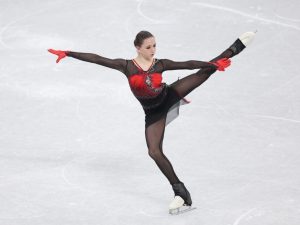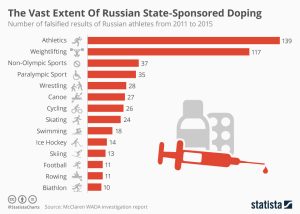On December 25th, 2021, 15-year-old Russian figure skater Kamila Valieva won the Russian women’s national championship for figure skating in St. Petersburg, Russia. On that day, Valieva’s urine sample, taken to test for any performance-enhancing drugs that could boost an athlete’s physical performance, left for a Swedish World Anti-Doping Agency (WADA) lab on the same day. 5 weeks later, the Beijing 2022 Winter Olympics began in earnest on February 4th, 2022. Valieva, due to her winning the Russian women’s national figure skating championship, journeyed to China to represent her country under the Russian Olympic Committee, not under her own country name (the reason for which we will discuss later).

On February 8th, the Swedish WADA lab flagged the urine test as positive for Trimetazidine, a metabolic agent used to increase blood flow to curtail angina attacks (where blood flow to the heart becomes limited and thus can cause strokes). Banned by the Olympic Committee as a performance-enhancing drug, the use of Trimetazidine immediately sparked concerns throughout the Olympic Anti Doping Committee. This startling news came days after the Russian figure skating team earned gold in the women’s figure skating competition.
The Swedish laboratory stated that it could have sent the results earlier, but the Russian Olympic Committee had labeled the batch as “nonpriority” even though immediately testing for doping on Russia’s foremost figure skater is by all accounts highly important. Valieva was immediately suspended from the games following this revelation by the Olympic Committee, and an investigation panel was created.

However, Valieva’s legal defense made the claim that she had inadvertently ingested trimetazidine through her grandfather, who regularly takes the medicine. Valieva’s lawyer argued that “There can be completely different ways how it got into her body. For example, grandfather drank something from glass, salvia got in, this glass was somehow later used by an athlete. Or the drug lay down on some surface, traces remained, the drug lay down on this surface, which the athlete then drank.”
Doctors have cast doubt on this interpretation, with one cardiologist calling it “very far-fetched.” Dr. Donald Lloyd-Jones, president of the American Heart Association, added “I’ve seen no evidence it gets absorbed through the skin.” Dr. Lloyd-Jones also pointed out that Valieva was probably taking the drug in the days prior to the December 25th National figure skating competition, mentioning “It would seem implausible that a little bit on glass or on her skin would have resulted in a positive test unless it happened to be just before she provided the sample. One can draw inferences that either the exposure was very recent, very shortly before her test, or that she was exposed more chronically.”

Past Doping Scandals
Earlier, I mentioned how Kamila Valieva would go (alongside all other Russian athletes) under the Russian Olympic Committee, not her country. The reason for this aberration lies within previous Russian doping scandals that led to the country being banned from the Olympics. Russian Olympic Athletes would be forced to compete under the “Russian Olympic Committee”, the Russian flag was replaced by an Olympic flag, and the Russians were banned from possessing anti-doping labs.
The reasons for this are simple: for the past 25 years, the Russian government has been actively sponsoring, promoting, and facilitating the use of performance-enhancing drugs for their Olympic athletes competing. The 15-year-old Kamila Valieva has been, whether she is a willful participant or not, the continuation of this legacy of foul play.
1984 Moscow Olympics
In the 1980 Moscow Olympic Games, when the Soviet Union was still unified and the Cold War was raging on, doping was prevalent throughout the nations competing. The Russians utterly dominated the field, winning 195 medals and triumphing over 80 other nations competing. But years later, studies revealed how the USSR had systematically led doping operations to augment their athlete’s ability, forging anti-doping documents and even using KGB (the Russian intelligence and domestic security agency) to pose as Olympic anti-doping watchdogs. In an interview with Radio Free Europe, Konstantine Volkov, who won a silver medal in pole vaulting, turned in his urine sample to the Soviet medical team for doping analysis. An employee at the Moscow Lab told him “we throw all this out” and handed him a different container already filled with urine.

1984 Los Angeles Olympics
Russian doping efforts didn’t stop there, they actually became more efficient. In 1983, in preparation for the 1984 Los Angeles Summer Olympics, Soviet government officials ordered their track and field team to inject top runners with 4 types of anabolic steroids.
The reason for this? The Soviet team was worried that the American track and field team would eclipse them. “A dramatic performance against the Americans is necessary,” one KGB officer told the team. The Soviet athletes, many of whom were opposed to steroid usage, had some dissent. But steroids were ingested anyway in preparation for the Olympics in 1984, thanks to peer pressure. But the Russians suddenly withdrew from the Olympics and boycotted it in 1984, due to allegations that their athletes would be threatened or attacked by the American public.
2012 London Olympics
In 2012, the Soviet Union had long since collapsed, replaced by the Russian Federation. However, the doping continued. In the 2012 London Olympics, nearly 1,000 Russian athletes were discovered to have used performance-enhancing drugs. The Russians then deleted files containing the evidence of the scandal, had corrupt members of the Russian Anti-Doping Agency bought off or look the other way, and thus as Canadian Law, Professor Richard McLaren put it, “the Russian Olympic team corrupted the London Games on an unprecedented scale, the extent of which will probably never be fully established.”

2014 Sochi Olympics
In 2014, the Winter Olympics at Sochi, Russia kicked off. The Russian Olympic team dominated, winning the most gold medals (11) and most medals in total (29) out of any other team. But in 2015 and 2016, allegations emerged that the Russians had initiated a state-sponsored doping project aimed towards artificially improving their athletes’ physical performance. In a 300 page report, the World Anti-Doping Agency formally accused Russia of using Russia’s Secret Service to impersonate lab engineers at the Olympics and intimidated lab workers to cover up positive drug test results.

WADA also alleged that athletes used alternate identities to avoid testing and sports officials submitted false samples for competitors who were doping. The report included the following:
“The investigation indicates that the acceptance of cheating at all levels is widespread and of long-standing. Many of the more egregious offenders appear to be coaches who, themselves, were once athletes and who work in connection with medical personnel. This ‘win at all costs’ mentality was then passed to current athletes, whether willing to
participate or not. An athlete’s decision not to participate is likely to leave him
or her without access to top-caliber coaches and thus the opportunity to excel.
As a result of this mindset, an open and accepted series of unethical behaviors and practices has become the norm. In addition, the pursuit of medals and exploitation of athletes for financial gain is well pronounced across Russian athletics. Russian athletes were often willing participants. However, there are documented cases where athletes who did not want to participate in ‘the program’ were informed they would not be
considered as part of the federation’s national team for competition.”

The international communities’ response to this realization was swift. Russia was formally banned from competing in any Olympic sports until December of 2022. Russian athletes could still compete at the Olympics, but only if they traveled under the designation of the “Russian Olympic Committee”. Their uniforms were forbidden from having the Russian flag on it, and the Russian flag was replaced by a more neutral Olympic flag. When Russian athletes win a medal, they are awarded it under a Taichovsky song piece, not the Russian national anthem.
The 2022 scandal
In the midst of all the cheating and foul play, it’s hard to remember that the athletes competing are usually not the main actors at play. Driven by a “win at all costs” culture, pushed by uncompromising Soviet-era coaches, and feeling the inevitable pressures of competing at the Olympics, these athletes are often hesitantly thrust into these doping scandals. And Kamila Valieva, the immensely talented 15 year old we touched on earlier, is feeling this pressure. On February 15th, Valieva was given the green light to compete in women’s figure skating. She earned first place, edging out fellow Russian Anna Shcherbakova and Japan’s Kaori Sakamoto. However, the Olympic Committee will withhold her medals from her until the investigation concludes.

It is likely that her 47-year-old coach Eteri Tutberidze pushed Kamila to take the medication. Tutberidze has repeatedly discussed the elite status of her protégé, and her hopes for Kamila’s improvement as a skater. It may be possible that this coach, like so many other Russian and Soviet staff, pushed their athletes to engage in doping practices. Tutberidze has a history of training brilliant young Russian female skaters, like Yulia Lipnitskaya and Alina Zagitova. Granted almost complete autonomy by the Russian Olympic Commission, Eteri now possesses the means and the will to take Kamila to the top.
As the Associated Press reports, “Tutberidze can select the most promising young Russian skaters for her camp, which has enviable facilities and funding. At the national championships where Valieva tested positive in December, a Tutberidze skater won for the seventh year in a row.”
With huge amounts of funding, a long illustrious history of coaching, and a drive to go to the top, Tutberidze represents a long lineage of Soviet sports coaches willing to skirt morals in order to win. Worryingly for the young Kamila, Tutberidze’s former apprentices have not had long athletic careers. One Russian figure skater quit skating at age 17, stating that she needed “motivation” after losing to younger figure skaters. Another quit after a cracked bone in her ankle, and stated “I need a coach who can act like a friend.”

And for the Russian girl, going to the Olympics at age 15, and knowing how talented she is, it’s possible she took it willingly under duress or intimidation. And on Thursday, February 17th, Kamila Valieva competed to solidify her lead above other competitors. It went poorly. Valieva made mistakes on her first four jumps, followed by a fall to the ice later. As the music played, she choked back tears. The stress of international scrutiny apparently took its toll, and now Valieva now ranks 4th. She will carry home no gold medals, and will forever bear the burden of being known as the new figurehead of the Russian doping scandal.
In the immediate aftermath of Kamila’s lackluster performance, her coach chastised her as her student sat sobbing on the bench. “Why did you let it go?” she said to Valieva. “Explain it to me, why. Why did [you] stop fighting? You let it go after that axel. Why?” The toxic culture of the Russian skating team didn’t end there. Another Russian female figure skater, Alexandra Trusova (who won silver in female figure skating) angrily stated: “I will never go out on the ice again. Never! I hate! It’s impossible! You can not do it this way! I’m not going to the awards! Everyone has a gold medal! Only I don’t! I hate it all!”

Valieva’s future lacks certainty. When she returns home empty-handed, she may attempt to skate again and compete for gold. But like many of her coaches’ past students, Valieva may fall by the wayside in Russian female figure skating, never to be in the spotlight again. At the end of the day, as the Washington Post remarked before her loss on Thursday: “Even if Kamila wins gold, she will forever be defined by the doping scandal.” Unfortunately, this 15-year-old has become the new face of a decades-long story of foul play, and she will never be separate from that story.

